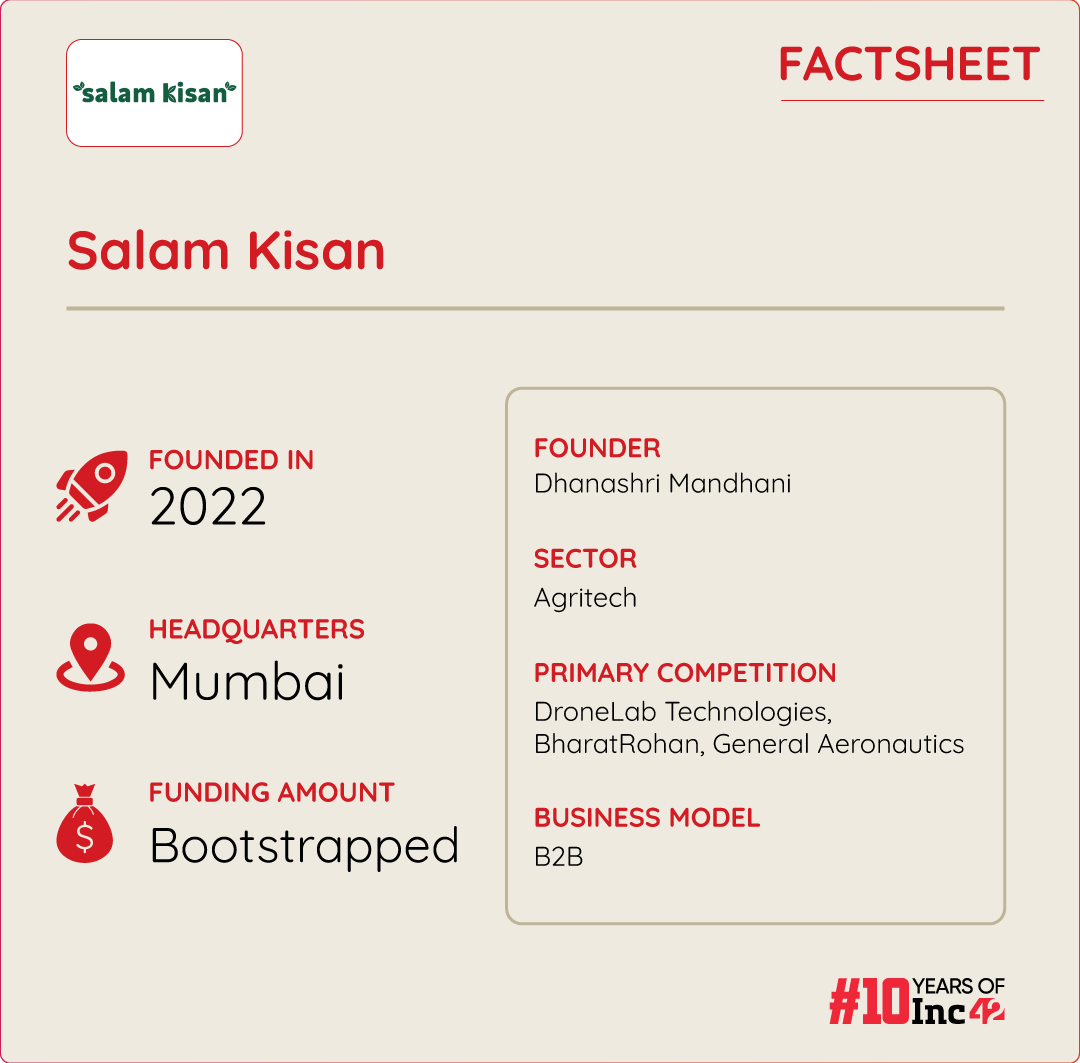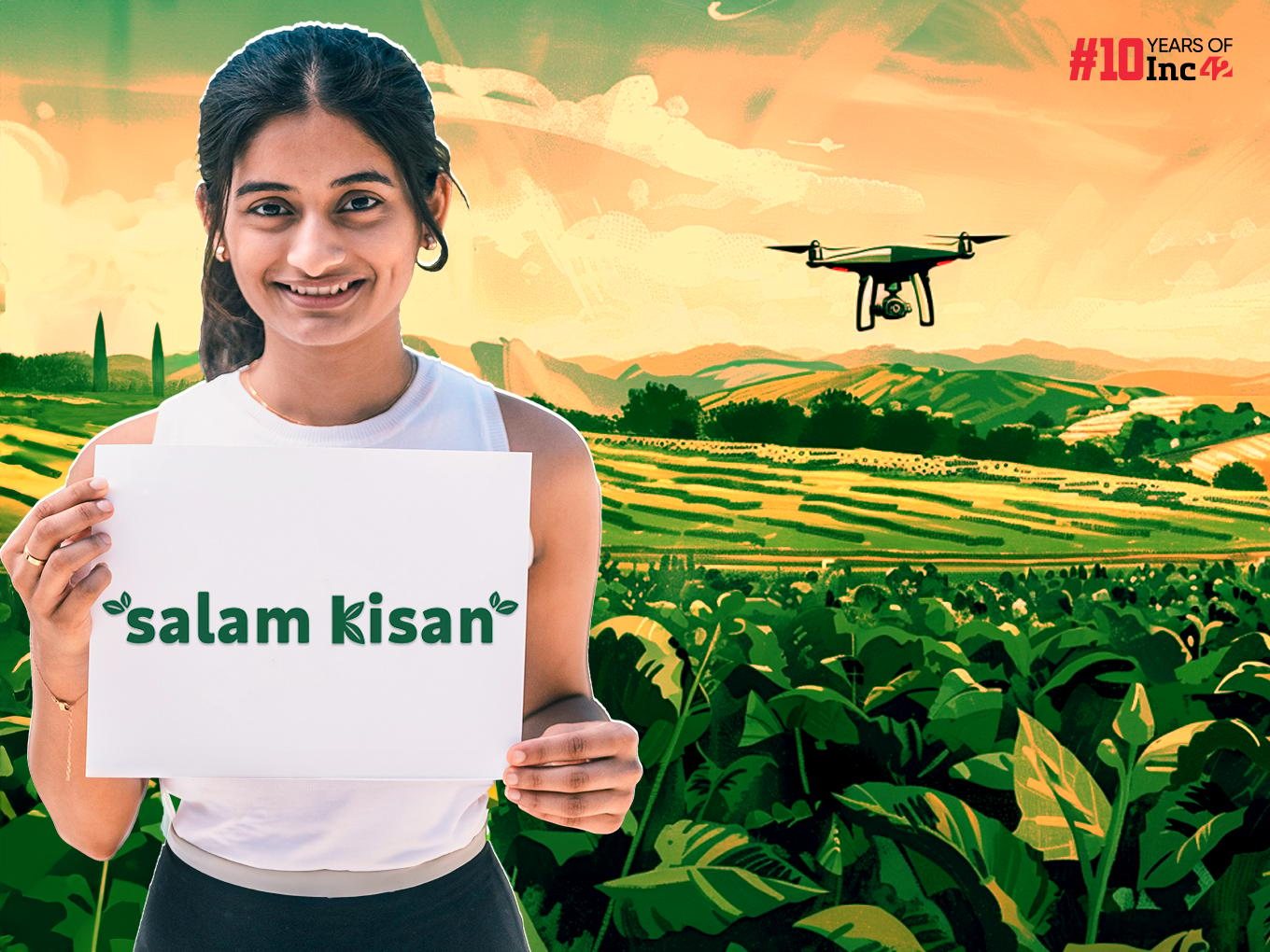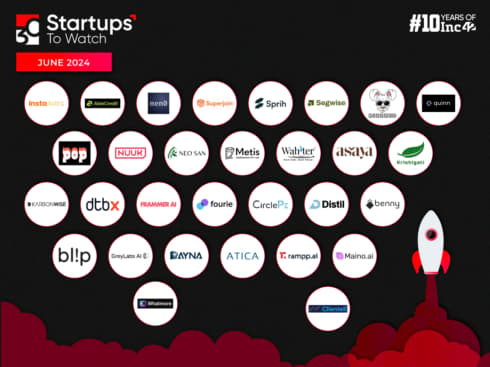Founded in 2022 by Dhanashri Mandhani, Salam Kisan is an end-to-end agritech startup, which offers services like drone-based soil testing, produce procurement, and marketplace offerings, to the farmers.
As a bootstrapped startup, Salam Kisan kick-started its journey with a preliminary investment of $2 Mn. It today has a user base of 58,000 farmers. The startup primarily earns its revenues from soil testing and drone services
Also, with drones as one of its key services, the startup eyes a juicy share of the market that, as per Inc42’s analysis, is expected to become a $13 Bn market opportunity by 2030
Nearly five decades ago, India opened its eyes to the dawn of the green revolution with the adoption of high-yielding variety of seeds, mechanised farm tools, pesticides, and fertilisers. Consequently, the country was able to cull widespread hunger and poverty and move from importing grains to a state of self-sufficiency.
Today, we are on the cusp of another green revolution in the agriculture space and leading this from the front are the country’s agritech startups armed with an artillery of sophisticated drones, deeptech expertise and more.
What’s also fuelling the growth of the country’s agritech space is the government’s commitment to provide support to the sector.
Notably, the Centre liberalised the drone industry in 2021, paving the way for their use in the Indian agri space and in areas of crop assessment, digitisation of land records, and spraying of pesticides.
This has not only helped Indian farmers unlock new opportunities but also entrepreneurs, who are making waves in the Indian agri space with their state-of-the-art services, top-of-the-class indigenous tech stack and intelligent drones.
Mumbai-based agritech startup Salam Kisan is one such name that is enabling the agricultural space with its ‘drone-as-a-service’ offerings and drone training to rural youth.
Founded in 2022 by Dhanashri Mandhani, Salam Kisan is an end-to-end agritech startup, which offers services like drone-based soil testing, produce procurement, and marketplace offerings, to the farmers.

With a major chunk of land mass being under agriculture in India, Salam Kisan sees itself as an emerging player in the agritech sector with unlocked opportunities worth multi-billion dollars.
Also, with drones as one of its key services, the startup eyes a juicy share of the market that, as per Inc42’s analysis, is expected to become a $13 Bn market opportunity by 2030.
The Salam Kisan Ecosystem
A business graduate from the University of Illinois Urbana-Champaign, Mandhani decided to leverage her knowledge and integrate it with technical research to empower the Indian farmers with the latest technologies.
Speaking with Inc42, founder and CEO Mandhani said that the idea behind floating the agritech startup was to aid marginal farmers holding small land holdings with the latest farming technologies.
Today, the startup offers drone-as-a-service to the farmers in Maharashtra. It has about 70-80 drones deployed across 22 districts of the state.
With Type-C DGCA clearance, the startup locks horns with rivals such as IoTex, Garuda, and Paras in the larger drone tech space.
In addition to aiding farmers in evaluating soil quality, pesticide spraying, and crop management, the startup offers a DGCI-certified drone pilot training course valued at INR 50,000 per pilot.
With its drone services, the startup has so far covered over 15,000 acres of land, aiding 7,500 farmers.
Mandhani told Inc42 that the startup provides end-to-end support to farmers — from soil testing to sowing and harvesting — via its app.
The application also has a marketplace for the farmers to buy agri inputs such as pesticides, fertilisers, seeds and farm equipment. Although the startup doesn’t offer logistics support for the delivery of those products, it has a network of more than 300 partner dealers and suppliers with offline stores.
In addition, the agritech startup offers crop procurement services to soya bean farmers. Further, Salam Kisan is all geared up to launch its financial services vertical in April this year. With this launch, it aims to streamline the process for farmers to access bank loans.
The Salam Kisan app also helps farmers find government websites that offer subsidies and other government support programmes.
How Does Salam Kisan Make Money?
As a bootstrapped startup, Salam Kisan kick-started its journey with a preliminary investment of $2 Mn. It today has a user base of 58,000 farmers. The startup primarily earns its revenues from soil testing and drone services.
For soil testing, Salam Kisan charges between INR 250 to INR 400 per acre, while drone services are priced between INR 450 to INR 600 per acre.
It levies a transaction fee on suppliers and vendors for listing their products on the Salam Kisan app. Additionally, farmers are charged a trading margin for soybean procurement services.
The Road Ahead
The startup aims to secure its first external funding round in the upcoming financial year. Facing operational challenges due to dependency on procured drones, Salam Kisan is now developing an in-house drone manufacturing unit, targeting the production of 250 drones by the end of March.
“We have opted for in-house drone manufacturing due to high downtime associated with procured drones,” Mandhani said.
While the manufacturing unit will be located in Jalna, Maharashtra, the R&D centre will be established in Bengaluru. The startup is also focussing on recruiting new pilots.
The prototype of its in-house drone is ready and awaits DGCA approval and a Type-C drone certification. These drones are expected to serve various purposes, including spraying chemicals, pesticides, and seeds.
Considering the nascent adoption of drones in India’s agricultural practices, Salam Kisan plans to introduce AI-powered multispectral and hyperspectral drones in the next financial year. Additionally, the startup may explore selling its in-house drones as products in the future.
The startup claims that 15% of its total farmer base today is women, which it aims to increase further. Salam Kisan also claims to have aligned itself with the Centre’s Drone Didi initiative, which aims to train at least 15,000 women as drone pilots.
“My primary goal with this company is also to formalise the women workforce, not just on farms but also within our company,” Mandhani told Inc42.
With an array of tech solutions available for farmers today and drones playing a central role in the country’s agritech space, which is expected to become a $24 Bn market opportunity by 2025, Salam Kisan’s growth story has just started to unravel.
































 Ad-lite browsing experience
Ad-lite browsing experience